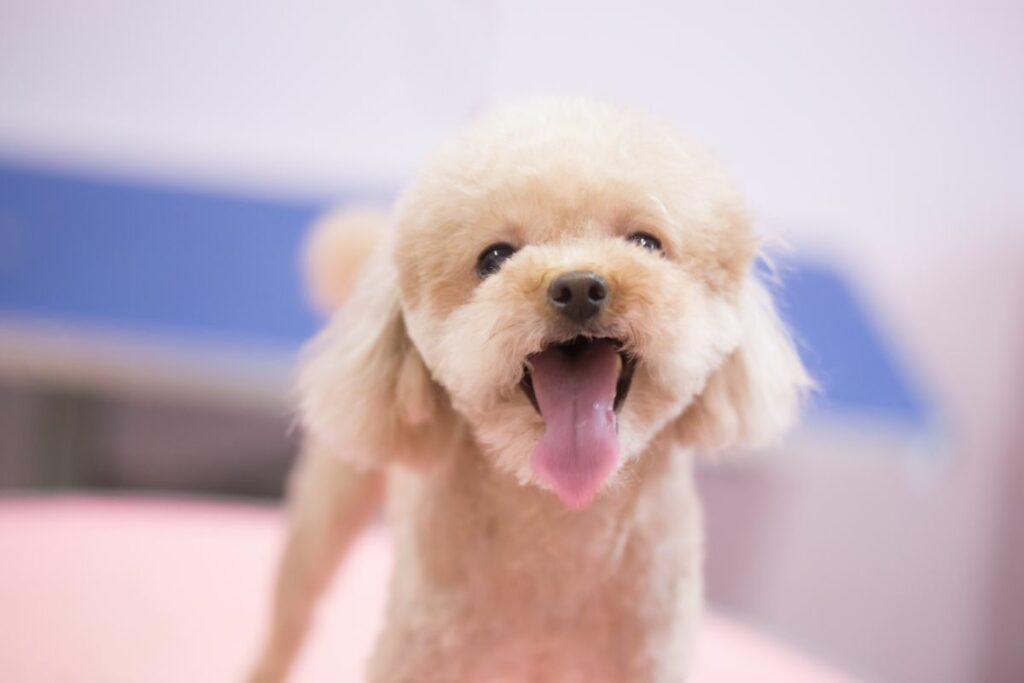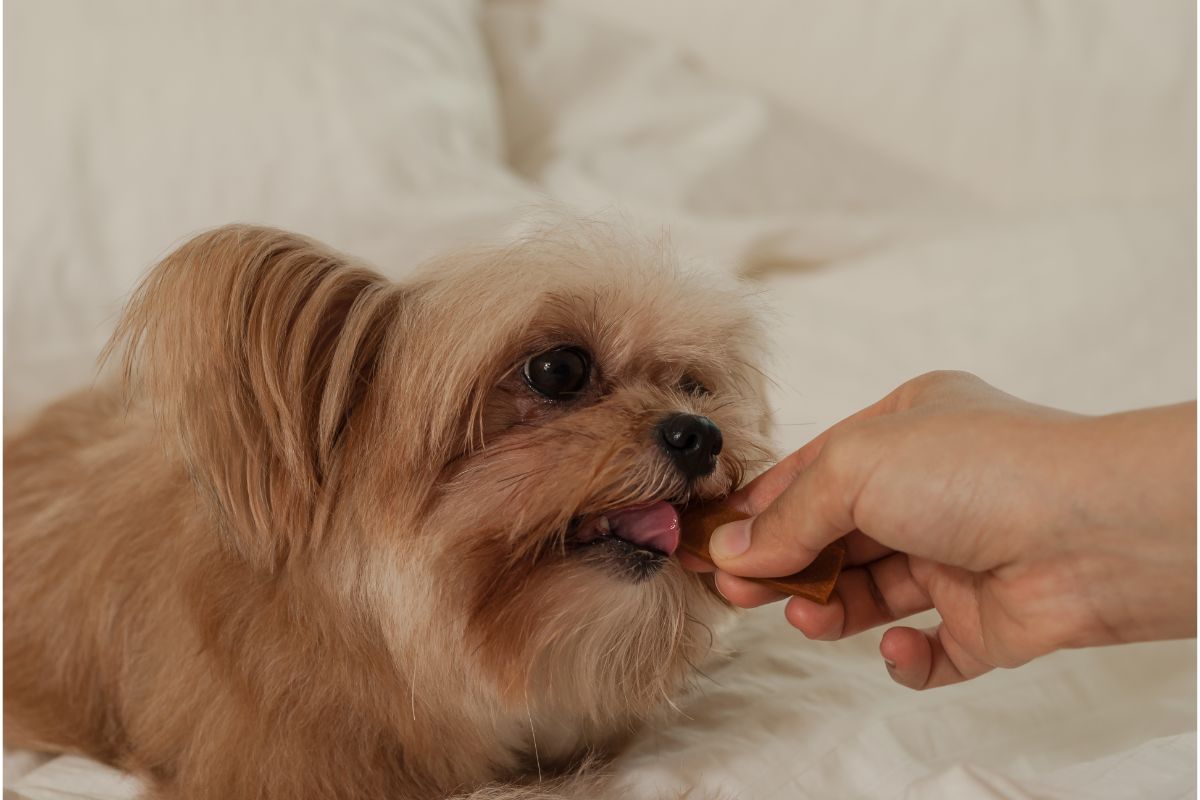Toy Poodles are smart, graceful, adorable little balls of fluff.
They are one of the smallest poodle varieties, but they pack plenty of personality into that dainty size.
If you’ve been mulling over bringing your own Toy Poodle home, keep reading.

In this guide, we’ve included all the basics on this breed’s history, temperament, and all the essential care information.
Breed Facts About Toy Poodles
There’s a little uncertainty surrounding when Toy Poodles first came to be, but according to the AKC, the breed was first bred in the US at the start of the 20th century.
They were created from the breeding of smaller poodles to create a desired size.
While maintaining the Poodle lineage’s trademark intelligence and versatility, Toy Poodles have become icons of sophistication and style in the dog world.
Toy Poodles are often a top choice in dog shows for their poise and trainability. They excel in obedience and agility competitions, showcasing their dynamic capabilities and intelligence.
These pooches are recognized for their curly, plush coats, which can be styled in various creative ways.
Their coats come in a myriad of colors, including black, white, apricot, and silver.
Their delicate yet sturdy build, along with a refined and alert expression, make Toy Poodles stand out.
They have dark, oval-shaped eyes – in colors of amber or brown – full of intelligence and warmth.
They have distinctive, high-set ears, which hang close to their heads. They have small, boop-able noses.
Toy Poodles are characterized by their affectionate nature, making them ideal companions.
They are quick learners, eager to please, and highly interactive with their human families.
Their compact size makes them perfect for apartment living, though they thrive equally well in larger homes with ample space for play.
Fun fact: Did you know that the Poodle is the national dog of France?
How Big Do Toy Poodles Get? Average Size, Lifespan, And Key Life Stages
Toy Poodles have a life expectancy of 10 – 18 years, and, as a smaller breed, they usually reach their adult height by six to eight months of age, but they may continue to fill out a little after this.
They reach their senior years at around the age of 8.
As with many dog breeds, the males are usually a little bigger than the females, but how big do Toy Poodles get?
Well, you can expect this little tyke to reach around 9 – 10 inches tall and weigh in at no more than a tiny 7 pounds (3 kg) – how adorable?
Now, let’s look at the key life stages of Toy Poodles:
- Two – Three Weeks Old: Toy Poodle puppies are born blind, deaf, and toothless. During the first two weeks, they rely entirely on their mother for warmth and nutrition. The pups begin to open their eyes and ears – this is a critical period for their sensory development as they start to take an interest in what’s going on around them.
- Four – Six Weeks Old: This is when their playful nature starts to emerge. Puppies will be more active, exploring their surroundings and starting to engage with littermates and humans. Weaning can also begin at this age.
- Eight – Ten Weeks Old: At this stage, Toy Poodle puppies are ready for their new homes. They will have received their first vaccinations and are ripe for beginning socialization and basic training.
- Six – Eight Months Old: At six to eight months old, this tiny pooch has pretty much reached its adult height – they may continue to build a little muscle and add a little weight after this point. Chat with your vet about whether this is a good time to move your pooch onto an adult diet.
Continue with training and socialization for a confident and obedient companion. - One to Two Years Old: Although they reach their physical maturity earlier, Toy Poodles continue to develop mentally and emotionally during this period.
- Eight Years and Older: As your Toy Poodle reaches the age of about eight, they enter their golden years. As a senior dog, they may require more specialized care, including diet adjustments and gentler exercise routines to maintain their health and well-being.

Toy Poodle Personality
These little doggos are super smart and eager to please – this makes them a pleasure to train, and this, coupled with their natural agility, makes them perfect for agility training and courses.
In fact, Poodles are considered to be one of the smartest dog breeds in the world, so you may well have a mini Einstein on your hands!
They are self-assured pooches with plenty of energy – they generally get on well with all members of the family.
It’s worth bearing in mind, however, that, despite being confident, they can suffer from separation anxiety.
Caring For Your Toy Poodle
Now that we are more clued up on this breed’s personality and life expectancy let’s take a look at the essential information for raising a happy and healthy Toy Poodle.
Diet
Starting with the diet, it’s essential to feed your Toy Poodle a high-quality diet packed with all the nutrients they need at each stage of their life.
As pups, your Toy Poodle will need a specialized diet that contains everything they need to grow strong bones and a healthy body.
After being weaned from Mom’s milk, your pup will need to be on puppy food; they will remain on this diet until they reach adulthood.
When weaning your pooch onto new food, be sure to do it gradually – introducing the new food over a number of weeks.
As a small breed of dog, it can be helpful to choose a small kibble for your Toy Poodle – it’s much more manageable for their tiny mouths.
When your doggo reaches around eight years old, it will be time to transition them to senior dog food.
Senior dog food is specifically developed to support an aging pooch with added glucosamine for joint health, as well as other essential ingredients.
As well as their primary diet, you can reward your Toy Poodle with the occasional treat. Opt for treats that are small, and remember that treats should only make up 10% of your dog’s overall diet.
Ensure there’s plenty of fresh water available for your Toy Poodle at all times.
Exercise
They may be small, but Toy Poodles have oodles of energy, and so need a good amount of exercise.
We would recommend setting aside one to two hours per day to exercise your Toy Poodle. Engage them with a brisk walk, a jog, or a fun game of fetch.
As intelligent dogs, they need plenty of mental stimulation, so provide plenty of play sessions in the home and offer them interactive and puzzle toys to keep their minds busy.
Grooming
Toy Poodles are not big shedders, but their beautiful coats do require plenty of grooming and may not be for the faint-hearted.
Their curly, dense fur requires regular maintenance to prevent matting and to keep them comfortable and healthy. We would recommend brushing them daily, if possible.
Toy Poodles also need haircuts every 4 to 6 weeks. Popular styles include the puppy cut (uniform length all over), the teddy bear cut (longer around the face), and the more traditional poodle cuts like the Continental or English Saddle.
While some grooming can be done at home, regular visits to a professional groomer are recommended for a thorough job, especially for haircuts and ear cleaning.
As well as coat care, it’s important to incorporate other elements into your grooming routine, such as:
- Ear Care: Their floppy ears can trap moisture, leading to infections. Clean their ears regularly with a vet-approved ear cleaner and keep the hair inside the ears trimmed.
- Nail Trimming: Trim their nails every 3-4 weeks. Overgrown nails can cause discomfort and lead to problems walking.
- Dental Care: Regular dental care is important to prevent tartar build-up and gum disease. Brush their teeth several times a week using dog-specific toothpaste.
- Eye Care: Keep the hair around their eyes trimmed to prevent irritation. Wipe away any discharge with a soft, damp cloth.
Other
With your grooming routine under wraps, your Toy Poodle full of nutritious food, and plenty of information on exercise under your belt, let’s take a look at a few more care considerations.
Your Toy Poodle will need vaccinations to keep them safe from potentially harmful diseases. Speak to your vet about the essential shots and when they should be given.
Don’t forget to flea and worm your pooch regularly, either. Adult Toy Poodles should be de-flead monthly (although some flea treatments do last longer), and they should be wormed roughly every three months.
Your vet can advise you of the best brands of wormers and flea treatments and the type you need to get for your dog’s weight.
Pups require more rigorous treatment for worms, so speak to your vet about choosing the right treatment and setting a suitable worming schedule.

Common Toy Poodle Health Problems
Let’s take a look at some of the common health problems your pooch could face. Like all breeds, Toy Poodles have certain conditions that they are more prone to, including:
- Eye Problems: These are common in toy poodles. They may develop conditions like Progressive Retinal Atrophy (PRA), which leads to blindness, or cataracts, which can also impair vision. Regular eye examinations are important for early detection and treatment.
- Dental Issues: Small dogs like the Toy Poodle are particularly prone to dental issues. They can experience increased tartar buildup and gum disease. Regular dental check-ups and teeth cleaning are essential for maintaining their oral health.
- Patellar Luxation: This is where the kneecap slips out of place. This condition can cause lameness or an abnormal gait and may require surgical intervention. It’s often hereditary, so checking the breeding history is crucial.
- Cushing’s Disease: Also known as hyperadrenocorticism, is a condition that can affect Toy Poodles and involves the overproduction of the hormone cortisol by the adrenal glands. This hormonal imbalance can have various causes, including a tumor in the pituitary gland (which is more common) or the adrenal gland or long-term use of steroids for other medical conditions.
- Heart Diseases: Toy Poodles can experience certain heart diseases, including Mitral Valve Disease and Patent Ductus Arteriosus, which affect heart function. Early diagnosis and treatment are vital for managing these conditions.
In Summary
Toy Poodles are much more than a show dog – they are a delightful companion and family pet.
These small but mighty dogs are smart, beautiful, and friendly – they’re truly full of personality.
In this guide, we’ve walked you through the history of this small pooch, how big they will get, and how to care for them.
Are you ready to welcome a Toy Poodle into your home and into your heart? We’re excited for you – you’re going to have a blast!
Frequently Asked Questions
What is the temperament of a Toy Poodle?
Toy Poodles are known for their intelligent, alert, and active nature. They are often friendly and social with both people and other dogs.
Are toy poodles cuddly dogs?
Yes, Toy Poodles are typically affectionate and enjoy cuddling with their owners.
Do Toy Poodles bark a lot?
Toy Poodles are known to bark quite a bit, as they are alert and communicative dogs.
However, with proper training and socialization, excessive barking can be managed and reduced.
Is a toy poodle a good family dog?
Yes, Toy Poodles are considered good family dogs due to their intelligent, affectionate, and playful nature, thriving in a family environment where they receive bundles of attention and interaction.
Is a Toy Poodle a good first dog?
Toy Poodles can be a good choice for first-time dog owners due to their intelligence and trainability, but they do require consistent grooming and mental stimulation.
Are toy poodles high maintenance?
Yes, Toy Poodles are considered high maintenance, primarily due to their grooming needs, including regular haircuts, and their need for mental and physical stimulation.
Can you leave a Toy Poodle alone?
Toy Poodles can be left alone for short periods, but they thrive on companionship and can develop separation anxiety if left alone for too long or too frequently.
- A Pawprint Pets Guide To Puppy Breeds – Toy Poodles - November 30, 2023
- A Pawprint Pets Guide To Puppy Breeds – Bernedoodles - November 28, 2023
- A Pawprint Pets Guide To Puppy Breeds – Belgian Shepherds - November 27, 2023










